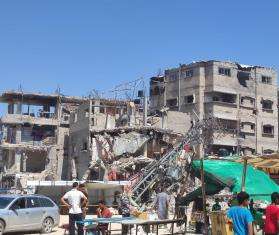One Child in Six Malnourished; Malnutrition Leading Cause of Death
New York/Luanda, June 28, 2002 — A nutritional survey released today by Epicentre, the research partner of Doctors Without Borders/Médecins Sans Frontières (MSF), confirms the severity of the nutritional crisis in Angola. The study, carried out from June 10-14 among 15,000 people in Chiteta in the northern part of Huambo province, found one child in six to be malnourished, malnutrition to be the leading cause of death, and death rates four times higher than normal.
In what is only the latest indication of the scale of the emergency in Angola, Epicentre found Chiteta's children under 5 to have a global malnutrition rate of 18% and a severe malnutrition rate of 5%. The survey also showed that over the last six months in Chiteta, deaths of children represented three-quarters of all deaths.
The mortality rate for children was 5.7/10,000 people per day—2.5 times the emergency threshold and five times the normal rate. The mortality rate for the general population was 2.3/10,000 people per day—four times greater than normal and twice the level that signifies an emergency.
"The level of severe malnutrition and mortality in Chiteta is alarming," said Vincent Brown, M.D., the chief epidemiologist of the survey, "even though MSF's nutritional programs in Bailundo have probably begun to contain both."
MSF treats more than 700 severely malnourished children in the therapeutic feeding center it opened in Bailundo, near Chiteta, late last month. Nearly everyday, MSF mobile medical teams transport severely malnourished people from Chiteta.
Immediate nutritional assistance is needed throughout the country. Thousands of Angolans have already died. International relief, though, has barely started to reach the hundreds of thousands of people deprived of it during Angola's 27-year civil war. Restricted access to quartering areas, where Unita soldiers and their families have gathered, has also frustrated the delivery of aid.
Since an April 4th cease-fire allowed MSF to gain access to people cut off from humanitarian assistance for years, MSF has found pockets of severe famine throughout Angola. MSF teams are currently treating more than 14,000 malnourished people at 44 feeding centers in 11 of the country's 18 provinces. Operations in Angola are the largest that MSF is undertaking worldwide, and the group expects to spend upwards of $30 million in Angola this year to try to meet the Angolan people's critical needs.


